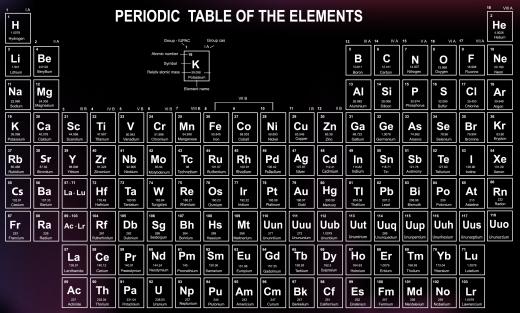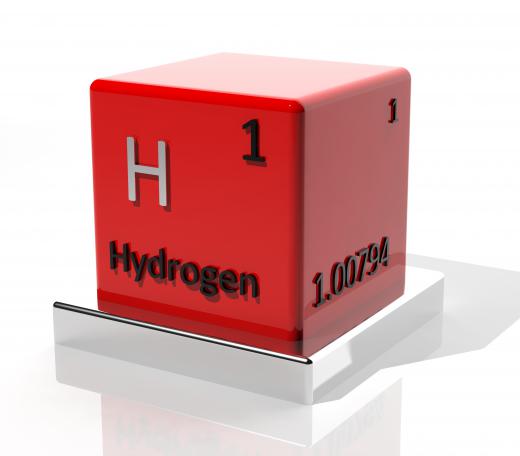What is Hydrogen?
 Mary McMahon
Mary McMahon
Hydrogen is a highly flammable chemical element that occurs in great abundance throughout the universe. In fact, this element makes up approximately 75% of the universe, by volume, and it appears in a very large number of compounds, especially those which make up various organic materials. Many people are familiar with hydrogen as a potential fuel source, thanks to its promotion as a potential alternative fuel, and everyone consumes it every day, in the water people drink and the foods they eat.
The atomic number of hydrogen is one, and it is identified by the symbol H on the periodic table. It is a unique standalone element, not classified with any other elements. Many scientists think of hydrogen as a kind of elemental building block, since its simple structure is the basis of so many things. The colorless, highly flammable gas has a number of industrial uses, especially in the refining of petroleum products.

The history of the discovery of hydrogen is quite lengthy. Like other gases, it rarely appears in a pure form on Earth, and it took some time for people to understand that it was an element. The gas was described as early as the 1400s, when experimenters combined acids and metals to produce a flammable gas. In 1671, Robert Boyle described this reaction in more detail, but it was not until 1766 that Henry Cavendish recognized hydrogen as a true element.

In 1783, Antoine Lavoisier proposed a name for the new element, adding together the Greek hydros for “water” and genes for “born or formed.” Lavoisier recognized that when hydrogen was burned, it produced water as a byproduct, through its combination with oxygen in the air. Thus, the element in a sense gives birth to water. Once hydrogen was fully recognized as an element, it began to be extracted from various natural sources and used in an assortment of fields.

Hydrogen is dangerous, as most people who know about the fate of the Hindenburg are aware. It was originally used as a lifting agent in balloons and zeppelins because it was so light, but the explosive nature of the gas led to the proposal of helium as a more stable and safe replacement. Since the element is so reactive, it must be handled with care to avoid unfortunate and explosive situations. Fortunately, few people work directly with pure hydrogen, and those who do are carefully trained.
AS FEATURED ON:
AS FEATURED ON:
















Discussion Comments
How can I collect hydrogen, purely? What would you need? Could you split water to get it?
74% of the elemental mass of this Universe and the Sun is hydrogen.
How heavy is hydrogen?
Hydrogen is a highly flammable chemical element.
i love this. it has helped with my project!
what is the source of hydrogen?
where is hydrogen found? where can i get it?
i want to learn about elements more. thank you for your big help.
where is hydrogen found? where can i get it?
Hydrogen is such a better source of fuel. The US Department of Energy states this in their 2007 report. We are a research and development company called thehydrogentoystore. we help semi trucks gain 50 percent more miles per gallon. Imagine how much this would help our economy if we could save the truckers money! Please take hydrogen energy seriously. It is not as dangerous as people think. If it were why would the US government approve it and state that it will replace gasoline? Thanks
How does H2 prduce CO2?
Can hydrogen be the best fuel to run cars?
Great !!! How can we get plenty of nice, clean non-polluting Hydrogen to run our cars?
1) by cracking hydrocarbons, you know, like petroleum. You just get mounds of sticky, gooey, black stuff (probably toxic) left over, not much good for anything except building roads.
2) making "water gas" - first you heat up coal in the absence of air and you get smelly gasses and tar plus white-hot coke. Then you feed in steam onto the coke and you get nice clean hydrogen (plus poisonous carbon monoxide) but everything cools down so you feed in a little air - the CO burns and heats things up again so the hydrogen process can carry on - but for every ton of H2 you make you also produce at least 22 TONS of CO2
3) electrolysis - using huge amounts of electricity. Don't quite know how you'd prefer to make all that electricity, but could be by damming more rivers, building more wind-farms, melting thousands of tons of sand in arc furnaces to make solar panels. You could also burn petroleum or coal or even uranium.
By the way, electrolysis is also the original (and preferred) method of producing heavy water.
Go figure.
Post your comments